Related Research Articles

Vincent Willem van Gogh was a Dutch Post-Impressionist painter who is among the most famous and influential figures in the history of Western art. In just over a decade, he created approximately 2100 artworks, including around 860 oil paintings, most of them in the last two years of his life. His oeuvre includes landscapes, still lifes, portraits, and self-portraits, most of which are characterised by bold colours and dramatic brushwork that contributed to the rise of expressionism in modern art. Van Gogh's work was beginning to gain critical attention before he died from a self-inflicted gunshot at age 37. During his lifetime, only one of Van Gogh's paintings, The Red Vineyard, was sold.
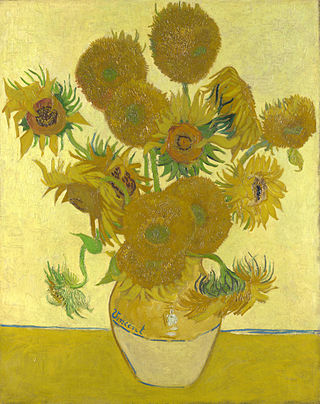
Sunflowers is the title of two series of still life paintings by the Dutch painter Vincent van Gogh. The first series, executed in Paris in 1887, depicts the flowers lying on the ground, while the second set, made a year later in Arles, shows a bouquet of sunflowers in a vase. In the artist's mind, both sets were linked by the name of his friend Paul Gauguin, who acquired two of the Paris versions. About eight months later, van Gogh hoped to welcome and impress Gauguin again with Sunflowers, now part of the painted Décoration for the Yellow House that he prepared for the guestroom of his home in Arles, where Gauguin was supposed to stay.

The Starry Night is an oil-on-canvas painting by the Dutch Post-Impressionist painter Vincent van Gogh, painted in June 1889. It depicts the view from the east-facing window of his asylum room at Saint-Rémy-de-Provence, just before sunrise, with the addition of an imaginary village. It has been in the permanent collection of the Museum of Modern Art in New York City since 1941, acquired through the Lillie P. Bliss Bequest. Widely regarded as Van Gogh's magnum opus, The Starry Night is one of the most recognizable paintings in Western art.

Theodorus van Gogh was a Dutch art dealer and the younger brother of Vincent van Gogh. Known as Theo, his support of his older brother's artistic ambitions and well-being allowed Vincent to devote himself entirely to painting. As an art dealer, Theo van Gogh played a crucial role in introducing contemporary French art to the public.
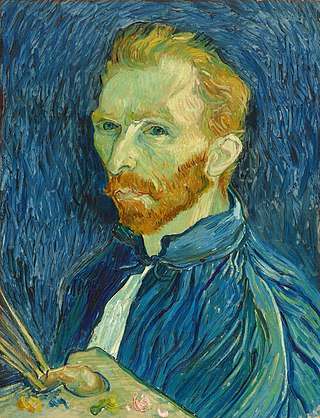
This is a chronology of the artist Vincent van Gogh. It is based as far as possible on Van Gogh's correspondence. However, it has only been possible to construct the chronology by drawing on additional sources. Most of his letters are not dated and it was only in 1973 that a sufficient dating was established by Jan Hulsker, subsequently revised by Ronald Pickvance and marginally corrected by others. Many other relevant dates in the chronology derive from the biographies of his brother Theo, his uncle and godfather Cent, his friends Émile Bernard and Paul Gauguin, and others.
The fame of Vincent van Gogh began to spread in France and Belgium during the last year of his life, and in the years after his death in the Netherlands and Germany. His friendship with his younger brother Theo was documented in numerous letters they exchanged from August 1872 onwards. The letters were published in three volumes in 1914 by Johanna van Gogh-Bonger, Theo's widow, who also generously supported most of the early Van Gogh exhibitions with loans from the artist's estate. Publication of the letters helped spread the compelling mystique of Vincent van Gogh, the intense and dedicated painter who died young, throughout Europe and the rest of the world.

Décoration for the Yellow House was the main project Vincent van Gogh focused on in Arles, from August 1888 until his breakdown the day before Christmas. This Décoration had no pre-defined form or size; the central idea of the Décoration grew step by step, with the progress of his work. Starting with the Sunflowers, portraits were included in the next step. Finally, mid-September 1888, the idea took shape: from this time on he concentrated on size 30 canvases, which were all meant to form part of this Décoration.
Vincent Van Gogh was displayed at the 1890 Les XX exhibition—an invitation-only show exclusively for members—in Brussels, Belgium. This served to demonstrate the recognition Van Gogh received from his avant-garde peers during his life. The choices of his works and their arrangements illustrated his thinking about his years of work in Provence.

The Painter of Sunflowers is a portrait of Vincent van Gogh by Paul Gauguin. Van Gogh is depicted sitting before an easel, presumably painting his “Sunflower” series. The work, which is a piece from Gauguin’s “Arles Period”, was created in Arles, France, in December, 1888. The painting is in the collection of the Van Gogh Museum in Amsterdam.

This is a list that shows references made to the life and work of Dutch artist Vincent van Gogh (1853–1890) in culture.

Johanna Gezina van Gogh-Bonger was a multilingual Dutch editor who translated the hundreds of letters of her first husband, art dealer Theo van Gogh, and Vincent van Gogh.
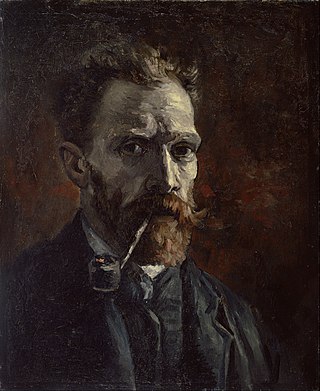
Vincent is an opera in three acts by Einojuhani Rautavaara first performed in 1990. The libretto is by the composer, and consists of scenes from the life of the artist Vincent van Gogh, told in retrospect.
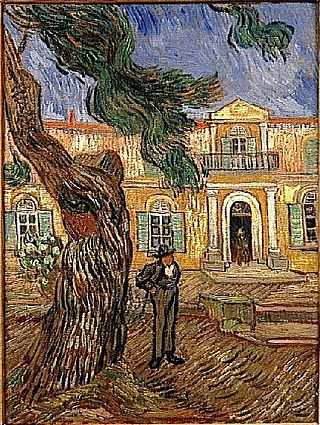
Saint-Paul Asylum, Saint-Rémy is a collection of paintings that Vincent van Gogh made when he was a self-admitted patient at the Saint-Paul asylum in Saint-Rémy-de-Provence, since renamed the Clinique Van Gogh, from May 1889 until May 1890. During much of his stay there he was confined to the grounds of the asylum, and he made paintings of the garden, the enclosed wheat field that he could see outside his room and a few portraits of individuals at the asylum. During his stay at Saint-Paul asylum, Van Gogh experienced periods of illness when he could not paint. When he was able to resume, painting provided solace and meaning for him. Nature seemed especially meaningful to him, trees, the landscape, even caterpillars as representative of the opportunity for transformation and budding flowers symbolizing the cycle of life. One of the more recognizable works of this period is The Irises. Works of the interior of the hospital convey the isolation and sadness that he felt. From the window of his cell he saw an enclosed wheat field, the subject of many paintings made from his room. He was able to make but a few portraits while at Saint-Paul.

Van Gogh's family in his art refers to works that Vincent van Gogh made for or about Van Gogh family members. In 1881, Vincent drew a portrait of his grandfather, also named Vincent van Gogh, and his sister Wil. While living in Nuenen, Vincent memorialized his father in Still Life with Bible following his death in 1885. There he also made many paintings and drawings in 1884 and 1885 of his parents' vicarage, its garden and the church. At the height of his career in Arles he made Portrait of the Artist's Mother, Memory of the Garden at Etten of his mother and sister and Novel Reader, which is thought to be of his sister, Wil.

Vincent van Gogh died in the early morning of 29 July, 1890 in his room at the Auberge Ravoux, in the French village of Auvers-sur-Oise, after presumably shooting himself two days earlier.
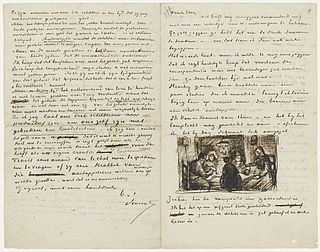
The Letters of Vincent van Gogh is a collection of 903 surviving letters written (820) or received (83) by Vincent van Gogh. More than 650 of these were from Vincent to his brother Theo. The collection also includes letters van Gogh wrote to his sister Wil and other relatives, as well as between artists such as Paul Gauguin, Anthon van Rappard, and Émile Bernard.

Houses at Auvers is an oil painting by Vincent van Gogh. It was created towards the end of May or beginning of June 1890, shortly after he had moved to Auvers-sur-Oise, a small town northwest of Paris, France.

Rain is an oil-on-canvas painting by Vincent van Gogh, created in 1889, while he was a voluntary patient at an asylum in Saint-Rémy-de-Provence. He repeatedly painted the view through the window of his room, depicting the colours and shades of the fields and hills around Saint-Rémy as they appeared at various times of day and in varying weather conditions. Rain measures 73.3 cm × 92.4 cm and is held by the Philadelphia Museum of Art in the United States.
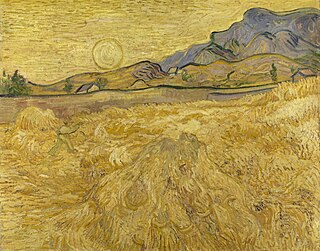
Reaper, Wheat Field with Reaper, or Wheat Field with Reaper and Sun is the title given to each of a series of three oil-on-canvas paintings by Vincent van Gogh of a man reaping a wheat field under a bright early-morning sun. To the artist, the reaper represented death and "humanity would be the wheat being reaped". However, Van Gogh did not consider the work to be sad but "almost smiling" and taking "place in broad daylight with a sun that floods everything with a light of fine gold".
References
- 1 2 Rabinowitz, Chloe. "New Musicals STARRY and SEASONS Will Headline New York Theatre Barn's New Work Series". BroadwayWorld.com. Retrieved 7 January 2023.
- 1 2 Wild, Stephi. "STARRY Original Concept Album to Be Re-Released With New Songs". BroadwayWorld.com. Retrieved 7 January 2023.
- 1 2 3 Wood, Alex (24 March 2022). "Van Gogh musical Starry to have workshop from this month ahead of 2023 world premiere | WhatsOnStage". www.whatsonstage.com. Retrieved 7 January 2023.
- 1 2 3 4 Darvill, Josh (24 March 2022). "New Van Gogh musical Starry announces London Workshop". Stage Chat. Retrieved 7 January 2023.
- 1 2 3 "Episode 12: MATT DAHAN & KELLY LYNNE D'ANGELO". Broadway Podcast Network. Retrieved 13 January 2023.
- 1 2 3 4 5 Rosky, Nicole. "BWW Interview: Kelly Lynne D'Angelo Goes Van Gough with New Musical, STARRY". BroadwayWorld.com. Retrieved 7 January 2023.
- 1 2 3 4 5 6 Putnam, Leah; Wiltbank, Michael (6 April 2022). "Take a Peek at the Industry Workshop of New Vincent Van Gogh Musical Starry in London". Playbill. Retrieved 7 January 2023.
- 1 2 Musbach, Julie. "STARRY, A New Musical About Brothers Theo & Vincent Van Gogh, To Premiere In Los Angeles This Summer". BroadwayWorld.com. Retrieved 7 January 2023.
- 1 2 Musbach, Julie. "Sherie Rene Scott & Norbert Leo Butz, Joe Iconis, and More Set for 54 Below This Month". BroadwayWorld.com. Retrieved 7 January 2023.
- 1 2 Stier, Julia (10 October 2018). "STARRY, reviewed by Julia Stier". STAGE RAW. Retrieved 7 January 2023.
- ↑ Rabinowitz, Chloe. "STARRY, a Pop-Rock Musical About Vincent van Gogh, Will Return to Feinstein's/54 Below". BroadwayWorld.com. Retrieved 7 January 2023.
- ↑ Musbach, Julie. "Pop-Rock Musical about Vincent van Gogh, STARRY, to Debut at Edinburgh Fringe". BroadwayWorld.com. Retrieved 7 January 2023.
- ↑ "Starry, A New Musical In Concert - Monday 12th August 2019". The Voodoo Rooms. Retrieved 7 January 2023.
- ↑ @starrymusical. """A breathtaking new musical…" - Stage Raw ✨ That's right! - we're going to @edfringe with our concert series of #Starry from August 12th-14th, with shows both at the Voodoo Rooms (18+) and The Liquid Room Annex!"". Instagram. Retrieved 13 January 2023.
- ↑ Harms, Talaura (24 February 2021). "Taylor Iman Jones, Jelani Remy, Marc delaCruz, and More Perform New Works for New York Theatre Barn". Playbill. Retrieved 7 January 2023.
- ↑ Chan, Goldie. "Revealing Unforgettable Stories With Kelly Lynne D'Angelo". Forbes. Retrieved 7 January 2023.
- 1 2 Riggio, Kaitlyn (3 February 2020). "REVIEW: "Starry" concept album shines with impressive musical moments, potential for growth – The Daily Free Press" . Retrieved 7 January 2023.
- ↑ "Images Released from Workshop of Starry". Theatre Weekly. 6 April 2022. Retrieved 7 January 2023.
- ↑ "STARRY". starrymusical.com. Retrieved 13 January 2023.